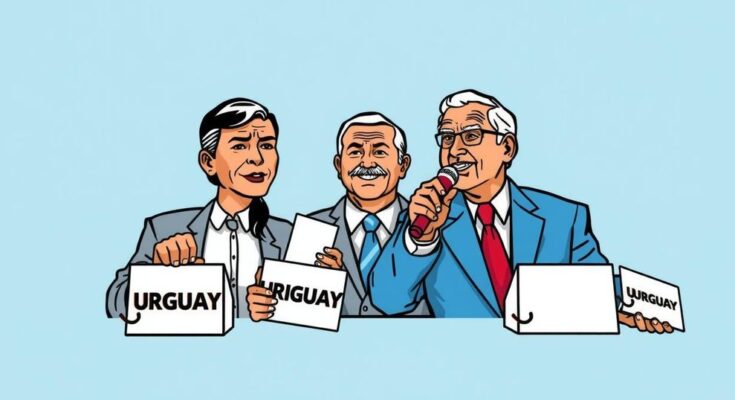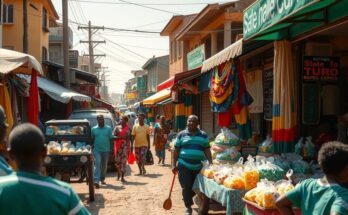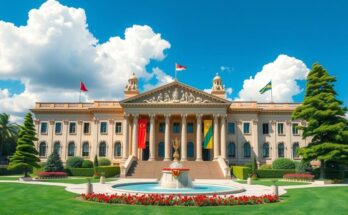Voters in Uruguay participated in a presidential election featuring moderate candidates, reflecting the country’s political stability in a turbulent region. With a high turnout of over 88%, the election also included a critical referendum on social security. The incumbent’s successor, Álvaro Delgado, faced challenger Yamandú Orsi, with polls indicating a potential runoff. The campaigns were notably respectful, emphasizing the nation’s democratic values amid discussions on social policies.
On Sunday, voters in Uruguay participated in a presidential election featuring two moderate candidates, underscoring the country’s tradition of political stability in a region often characterized by turmoil. As citizens cast their votes, they also had the option to select members for Parliament and decide on a contentious referendum aimed at reforming the social security system. Remarkably, voter turnout exceeded 88 percent among 2.7 million eligible participants, highlighting the nation’s commitment to engagement, as voting is mandatory for the populace. The election was marked by a rare consensus among the candidates on key issues, promising that the results would likely not lead to significant shifts in policies for the 3.4 million Uruguayan citizens. Political analysts consider this predictability advantageous, especially when contrasted with the dramatic political shifts occurring in neighboring countries like Argentina and Brazil. Political analyst Juan Cruz Díaz remarked, “In a way, Uruguay has been boring, but boring in this sense is very good.” With the current center-right president, Luis Lacalle Pou, barred from seeking a second consecutive term, Álvaro Delgado, a congressman and former chief of staff, represented the ruling party. His opponent, Yamandú Orsi from the center-left Frente Amplio coalition, described the election as a significant moment for democracy, saying, “Uruguay has had the happiness for 40 uninterrupted years … the happiness that our citizens can elect their leaders.” Polls indicated a potential run-off, with Orsi leading yet needing an outright majority. The campaigns, devoid of the harsh rhetoric typical of political contests in other regions, fostered a celebratory ambiance among supporters, symbolized by a festive gathering along Montevideo’s coastline. Voters expressed optimism about the democratic process, echoing sentiments expressed by former President José “Pepe” Mujica: “We need to support democracy, not because it is perfect, but because humans have not yet invented anything better.” Additionally, this election was not solely focused on the presidential race; voters also faced decisions on important social issues, including a proposal to overhaul the social security system. This initiative is backed by labor unions and, if approved, would lower the retirement age and increase benefits, despite concerns about its impact on national finances. This election highlights a unique moment in Uruguayan politics where the electorate remains engaged, yet cautious about potential changes, reflecting a broader trend of stability in the nation’s governance amidst regional uncertainties.
Uruguay is widely recognized for its political stability compared to other Latin American nations which frequently experience fluctuations and unrest. In recent electoral processes, the country has maintained a moderate approach, with candidates generally holding similar positions on major issues, thus appealing to a populace that values consensus and stability. This specific election is significant not only for the choice of the next president but also due to the concurrent votes on parliamentary members and a vital referendum concerning the social security system, reflecting the complexity and relevance of public concerns in contemporary Uruguayan society.
In conclusion, Uruguay’s electoral process illustrates a commitment to democracy and political stability, as evidenced by the significant voter turnout and the moderate tone of the campaigns. The election serves as a testament to the electorate’s satisfaction with current governance and the meticulous consideration of vital social reforms. While the presence of two moderate candidates fosters a sense of continuity in leadership, the outcome of the referendum and its implications for social security reform will further define the trajectory of Uruguay’s political landscape.
Original Source: www.pbs.org




